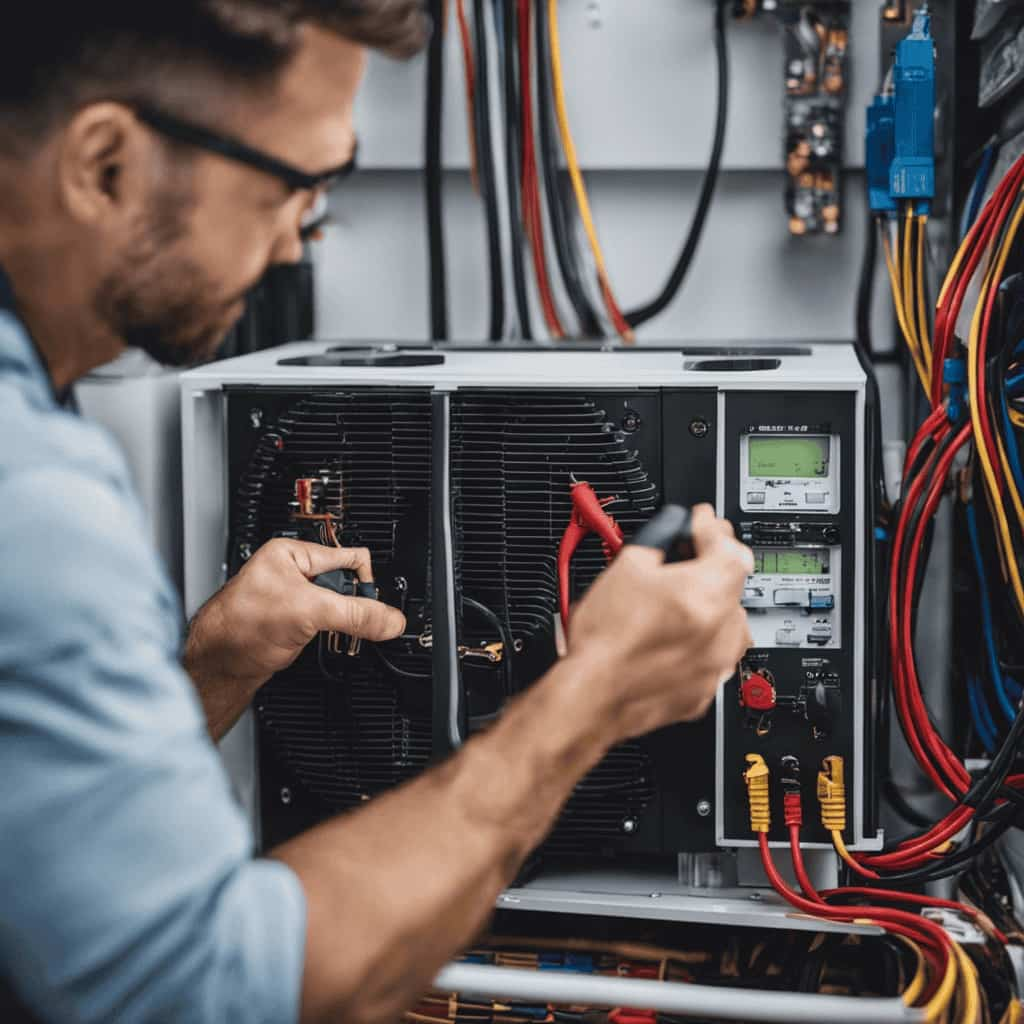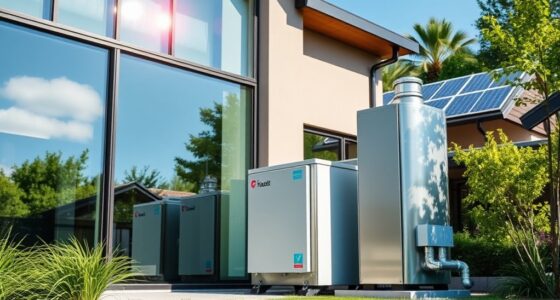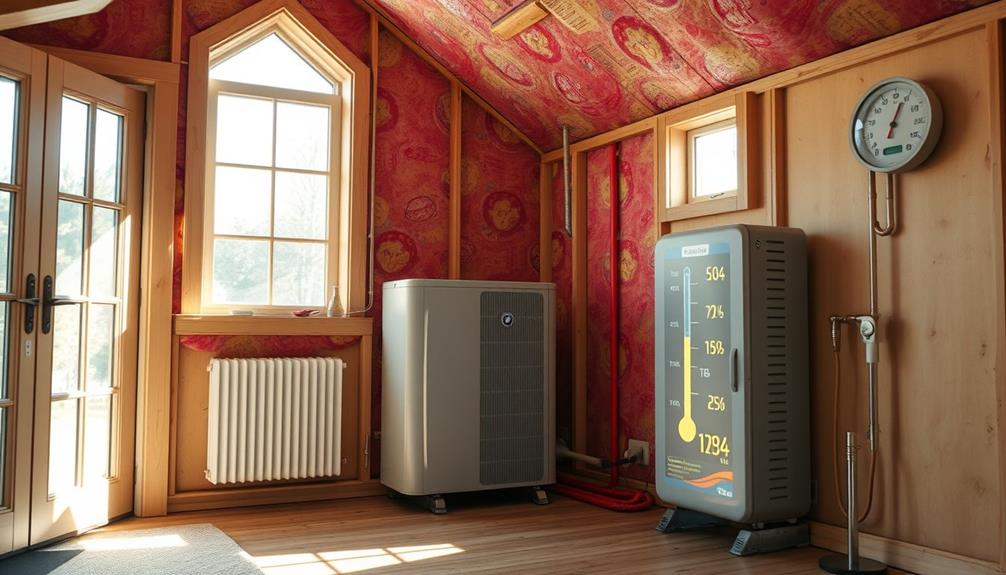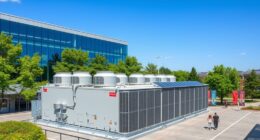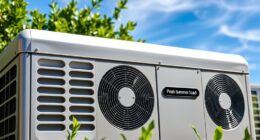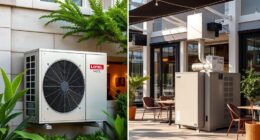Exploring HVAC systems specifically made for cold climates, we are amazed by the technological progress that has turned high-quality heat pump systems into a reality.
In this article, we will explore the efficiency, performance, and benefits of these high-performance systems in frigid temperatures. By understanding the factors to consider when choosing a heat pump HVAC system and optimizing its performance, we can ensure reliable and durable operation even in freezing conditions.
Get ready to unlock the secrets of staying warm in the coldest climates.
Key Takeaways
- Heat pump systems can be evaluated for their efficiency and performance in cold weather conditions.
- The coefficient of performance (COP) of heat pumps should be analyzed to assess their heating capacity and efficiency at lower temperatures.
- System design features like variable-speed compressors and optimized defrost cycles can improve the performance of heat pump systems in cold weather.
- Proper insulation and air sealing of the home can maximize the efficiency of heat pump systems in cold weather.
Evaluating the Efficiency of Heat Pump HVAC Systems for Cold Climates
We frequently evaluate the efficiency of heat pump HVAC systems for cold climates. When it comes to energy efficient options, it’s crucial to consider the cold weather performance of these systems. In colder climates, heat pumps face challenges such as lower outdoor temperatures and the need for defrost cycles.

To ensure optimal performance, we analyze the coefficient of performance (COP) of heat pumps in cold weather conditions. COP is a measure of how much heat the system can produce compared to the amount of electricity it consumes. We also assess the heating capacity and efficiency at lower temperatures, as this is a critical factor for reliable and efficient operation in cold weather.
Comparing the Performance of Top Heat Pump HVAC Systems in Frigid Temperatures
When comparing the performance of top heat pump HVAC systems in frigid temperatures, there are several important factors to consider.
First, we need to evaluate the cold weather efficiency of these systems to determine how well they can maintain comfort in extreme temperatures.
Second, it’s crucial to examine the energy consumption differences between different heat pump models, as this can have a significant impact on long-term operating costs.
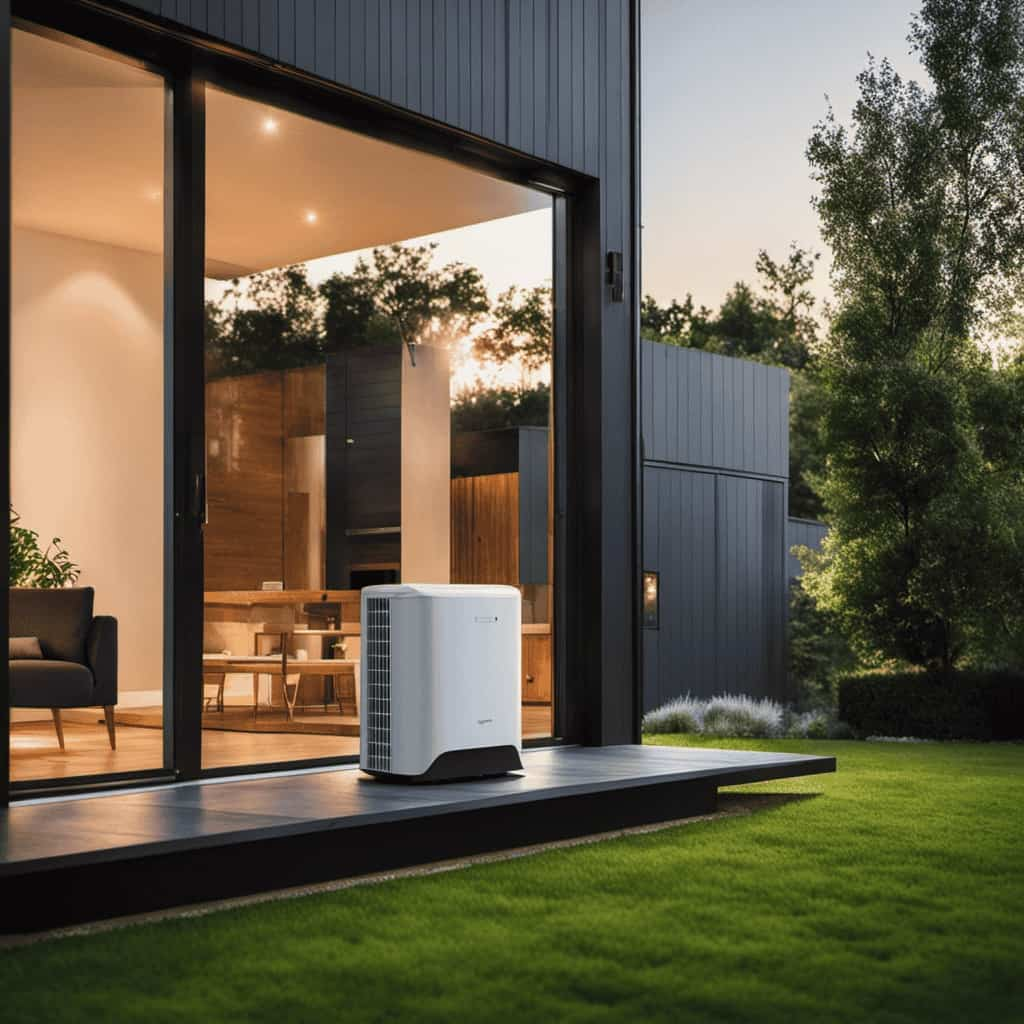
Lastly, we must assess the reliability of these systems in extreme temperatures to ensure they can withstand harsh weather conditions without compromising performance.
Cold Weather Efficiency
Comparing the performance of top heat pump HVAC systems in frigid temperatures reveals their cold weather efficiency. When it comes to improving efficiency and winter performance, there are a few key factors to consider:
-
System Design: High-quality heat pumps are specifically designed to operate efficiently even in extremely cold temperatures. They feature advanced components such as variable-speed compressors and optimized defrost cycles, which help maintain efficient operation in low ambient conditions.
-
Insulation and Air Sealing: Proper insulation and air sealing of the home are essential for maximizing the efficiency of heat pump systems in cold weather. By minimizing heat loss and preventing cold air infiltration, homeowners can ensure that the heat pump works optimally.

Energy Consumption Differences
To understand the energy consumption differences in top heat pump HVAC systems in frigid temperatures, it’s important to analyze their performance. Energy efficiency plays a crucial role in determining the effectiveness of these systems.
The ability to provide sufficient heating while minimizing energy consumption is a key factor in selecting the right heat pump HVAC system. When comparing different systems, it’s essential to consider their coefficient of performance (COP), which measures the ratio of heating output to electrical input. A higher COP indicates greater energy efficiency, resulting in lower energy consumption and reduced environmental impact.
Additionally, the type and quality of insulation used in the system can also impact energy consumption.
Reliability in Extreme Temperatures
In evaluating the performance of top heat pump HVAC systems in frigid temperatures, our focus lies on the reliability of these systems. When subjected to extreme temperatures, heat pump HVAC systems face several reliability challenges. Here are some key factors to consider:

-
Defrosting capability: The ability of the system to effectively defrost in extreme cold is crucial for its reliability.
-
Compressor protection: Heat pump HVAC systems need robust compressor protection mechanisms to ensure reliable performance in frigid temperatures.
Understanding the challenges faced by these systems in extreme temperatures is essential for selecting a reliable heat pump HVAC system. By addressing these challenges, manufacturers can improve the overall performance and dependability of their systems.
As we transition to the subsequent section, it’s important to appreciate the benefits that heat pump HVAC systems offer in cold weather.
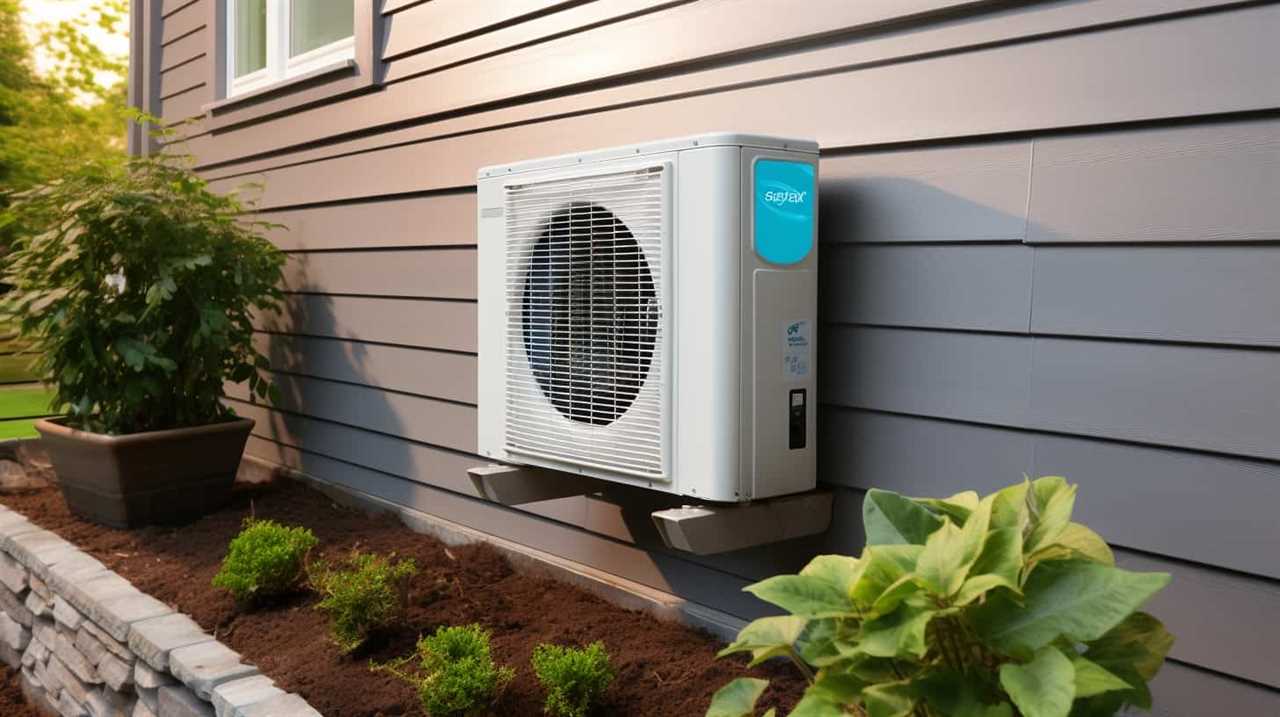
Understanding the Benefits of Heat Pump HVAC Systems in Cold Weather
When it comes to heat pump HVAC systems in cold weather, one of the key benefits is their efficiency. These systems are designed to operate efficiently even in low temperatures, ensuring optimal performance when you need it most.
Additionally, heat pump HVAC systems are known for their lower energy consumption compared to traditional heating systems, resulting in cost savings for homeowners.
Lastly, these systems provide year-round heating and cooling, offering versatility and comfort throughout the seasons.
Efficiency in Cold Weather
We can maximize the efficiency of heat pump HVAC systems in cold weather by understanding their benefits. Here are some energy-saving tips and winter maintenance recommendations to help you make the most of your heat pump:

-
Energy-saving tips:
-
Set your thermostat to a lower temperature when you’re not at home or overnight to reduce energy consumption.
-
Keep windows and doors properly sealed to prevent heat loss and maintain a comfortable indoor temperature.
-
Winter maintenance:

-
Regularly clean or replace air filters to ensure proper airflow and efficient operation.
-
Schedule professional maintenance to inspect the system, clean coils, and check refrigerant levels.
By following these tips and performing regular maintenance, you can ensure that your heat pump HVAC system operates at its highest efficiency during cold weather.
In the next section, we’ll further explore the concept of lower energy consumption and its relation to heat pump systems.
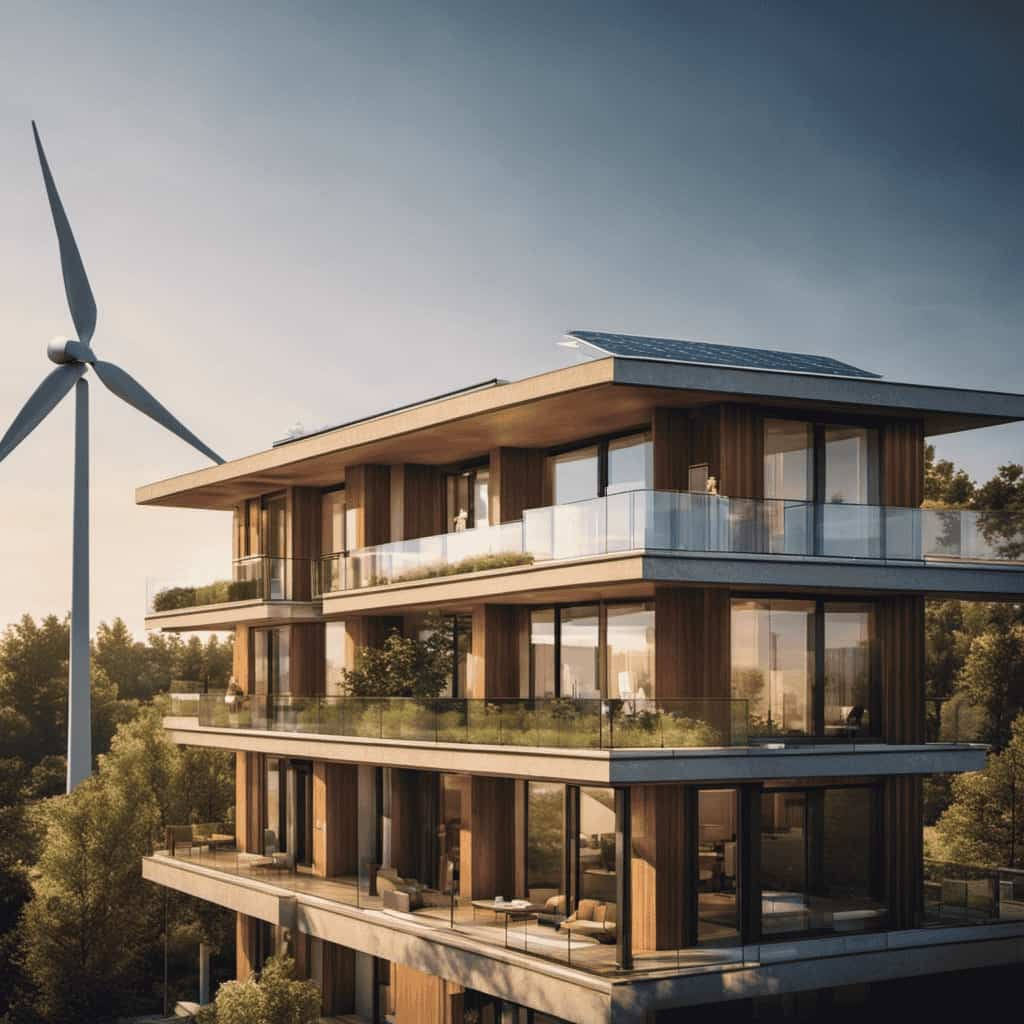
Lower Energy Consumption
To minimize energy consumption, we can take advantage of the benefits that heat pump HVAC systems offer in cold weather. These systems are designed to provide efficient heating by transferring heat from the outside air to the inside of the building. By using this method, heat pump HVAC systems can reduce consumption and save energy compared to traditional heating systems.
One of the key energy-saving techniques employed by heat pump HVAC systems is the use of variable-speed compressors. These compressors adjust their speed based on the heating load, allowing for precise temperature control and reducing energy waste. Additionally, heat pump systems often incorporate smart thermostats that can be programmed to optimize energy usage based on occupancy patterns and personal preferences.
To better understand the benefits of heat pump HVAC systems in terms of energy consumption reduction, let’s take a look at the table below:
| Energy Saving Technique | Description | Impact |
|---|---|---|
| Variable-speed compressors | Adjust compressor speed based on heating load | Reduces energy waste |
| Smart thermostats | Optimize energy usage based on occupancy patterns and preferences | Maximizes efficiency |
| Proper insulation | Minimize heat loss and maximize system performance | Lowers energy consumption |
Year-Round Heating and Cooling
Since heat pump HVAC systems can provide both heating and cooling functions, they offer year-round comfort and convenience in cold weather. With these systems, you can maintain a consistent and comfortable indoor temperature throughout the year, regardless of the outside conditions. Here are some advantages of heat pump systems for year-round temperature control:

-
Energy efficiency: Heat pumps are known for their high energy efficiency, as they transfer heat instead of generating it. This can lead to significant energy savings compared to traditional heating and cooling systems.
-
Cost savings: Lower energy consumption means lower utility bills, providing cost savings over time.
-
Environmentally friendly: Heat pumps produce fewer greenhouse gas emissions, making them a more sustainable choice for heating and cooling.
-
Versatility: Heat pump systems can be used for both heating and cooling, eliminating the need for separate systems and reducing installation and maintenance costs.

-
Consistent comfort: Heat pumps provide even heating and cooling throughout your home, ensuring a comfortable living environment year-round.
With these benefits, heat pump HVAC systems are an excellent choice for year-round temperature control in cold weather.
Exploring the Technology Behind High-Performance Heat Pump HVAC Systems for Cold Climates
Our team delves into the technology behind high-performance heat pump HVAC systems for cold climates. As heat pump technology advancements continue to evolve, these systems have become increasingly efficient even in the face of climate change. The impact of climate change on heat pump efficiency is a significant consideration when designing and selecting these systems for cold weather applications.
To provide a clearer understanding of the technology, we have created a table highlighting key features of high-performance heat pump HVAC systems:
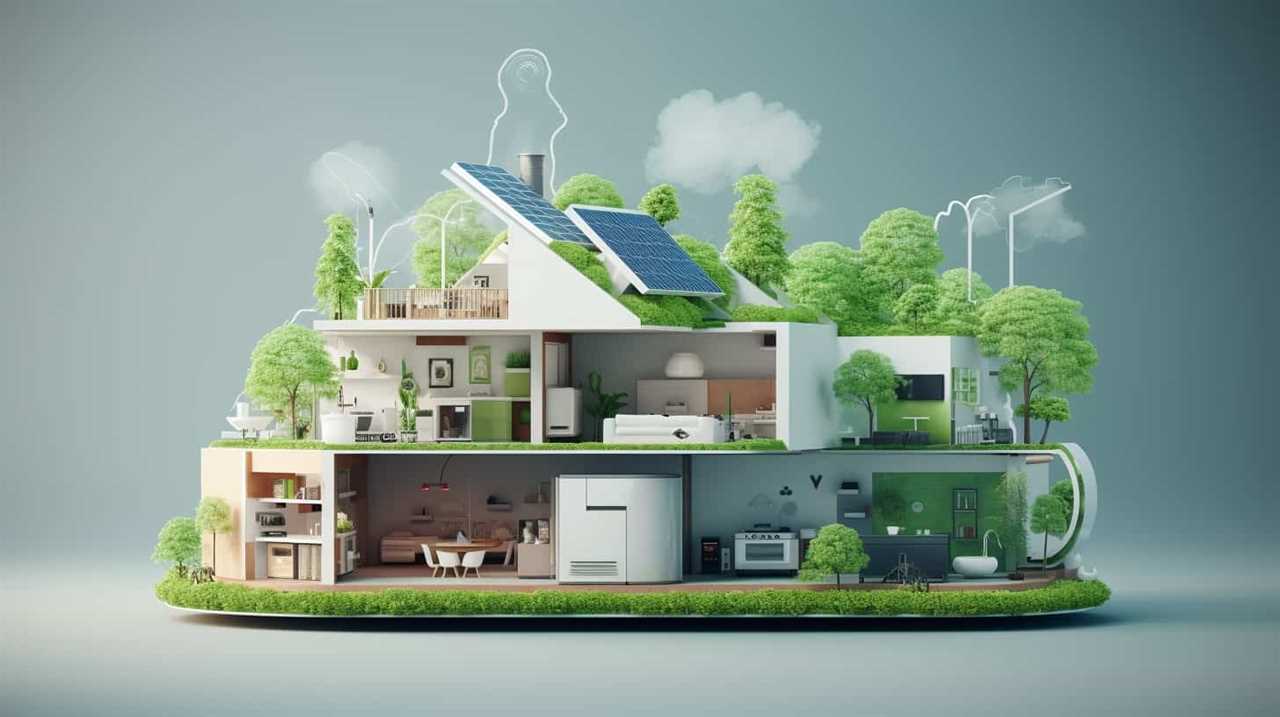
| Technology | Description |
|---|---|
| Variable Speed | Allows the system to adjust output based on demand |
| Two-Stage | Provides two levels of heating or cooling capacity |
| Scroll Compressor | Offers better efficiency and quieter operation |
| Intelligent Control | Optimizes system performance and energy consumption |
These advancements in heat pump technology have greatly improved the efficiency and performance of HVAC systems in cold climates. However, it is important to consider other factors when choosing a heat pump HVAC system for cold weather, which we will discuss in the next section.
Factors to Consider When Choosing a Heat Pump HVAC System for Cold Weather
When choosing a heat pump HVAC system for cold weather, there are several important factors to consider.
First, it’s essential to look at the energy efficiency ratings of the system, as a higher rating means it will consume less energy and save you money in the long run.
Additionally, you should assess the heating capacity and performance of the system to ensure it can provide sufficient warmth during extreme cold temperatures.

Lastly, it’s crucial to consider the defrosting capabilities of the heat pump, as this feature prevents ice buildup and ensures optimal performance in winter conditions.
Energy Efficiency Ratings
Considering energy efficiency ratings is essential when selecting a heat pump HVAC system for cold weather. Evaluating the performance and efficiency comparisons of different systems can help ensure that you choose the most cost-effective and environmentally friendly option. Here are two key factors to consider when evaluating energy efficiency ratings:
-
Seasonal Energy Efficiency Ratio (SEER): SEER measures the cooling efficiency of the heat pump. A higher SEER rating indicates better energy efficiency.
-
Heating Seasonal Performance Factor (HSPF): HSPF measures the heating efficiency of the heat pump. A higher HSPF rating indicates better energy efficiency.

By comparing the SEER and HSPF ratings of different heat pump systems, you can make an informed decision about which system will provide the best energy efficiency for your cold weather needs.
Now, let’s transition into the next section, which will discuss heating capacity and performance.
Heating Capacity and Performance
To ensure optimal performance in cold weather, it’s important to consider both the heating capacity and efficiency of a heat pump HVAC system.
Heating capacity refers to the system’s ability to produce heat, while efficiency determines how effectively it converts energy into heat. When evaluating heating capacity, factors such as the system’s BTU (British Thermal Unit) rating and its ability to maintain a consistent temperature in extreme conditions should be analyzed.

Performance evaluation involves considering the system’s COP (Coefficient of Performance), which measures the amount of heat produced per unit of electricity consumed. Additionally, the HSPF (Heating Seasonal Performance Factor) should be assessed, as it reflects the system’s energy efficiency over a heating season.
By carefully analyzing these factors, one can choose a heat pump HVAC system that delivers optimum heating performance in cold weather.
In the next section, we’ll discuss the importance of defrosting capabilities in winter.
Defrosting Capabilities in Winter
One important factor to consider is the number of defrosting cycles a heat pump HVAC system has in order to ensure efficient operation during winter months.

When choosing a heat pump HVAC system for cold weather, it’s essential to understand the defrosting techniques employed and their impact on energy efficiency.
The following are key considerations:
-
Defrosting method: Heat pumps typically use either timed defrosting or demand defrosting. Timed defrosting cycles are pre-set intervals at which the system temporarily stops heating to defrost the outdoor coil. Demand defrosting, on the other hand, relies on sensors to detect frost buildup and initiates defrosting only when necessary.
-
Defrosting frequency: The number of defrosting cycles a system performs should be appropriate for the climate in which it will operate. Too few defrosting cycles may lead to reduced efficiency, while excessive defrosting cycles can increase energy consumption.

Proper defrosting capabilities are crucial in maintaining the efficiency and performance of a heat pump HVAC system in winter. By considering the defrosting techniques and their impact on energy efficiency, you can make an informed decision when selecting a heat pump HVAC system for cold weather.
Top Features to Look for in a Heat Pump HVAC System for Cold Climates
We highly recommend prioritizing the inclusion of a defrosting feature in your heat pump HVAC system for cold climates. When evaluating the performance of a heat pump in cold weather, it’s crucial to consider its ability to defrost. As the outdoor temperature drops, the heat pump can accumulate frost or ice on its outdoor unit. This can significantly impact its energy efficiency and overall performance. A heat pump with a defrosting feature will automatically detect and remove frost or ice buildup, ensuring optimal operation even in freezing temperatures.
Look for a heat pump that offers a reliable and efficient defrosting mechanism, such as reverse cycle defrosting or hot gas defrosting. By prioritizing this feature, you can enjoy uninterrupted heating in cold weather conditions.
Moving on to the next section, let’s discuss the importance of proper sizing for heat pump HVAC systems in cold weather.

The Importance of Proper Sizing for Heat Pump HVAC Systems in Cold Weather
Proper sizing and adequate capacity are essential for heat pump HVAC systems to efficiently heat homes in cold weather. When it comes to heat pump systems, improper sizing can lead to a host of issues, including decreased performance and increased energy consumption.
To ensure proper sizing, it’s crucial to consider factors such as the climate in which the system will be installed, the size and layout of the home, and the level of insulation.
In addition to proper installation, regular performance evaluation is necessary to ensure the system is operating at its optimal efficiency. This can involve monitoring the system’s heating output, energy consumption, and overall performance.
Examining the Reliability and Durability of Heat Pump HVAC Systems in Freezing Conditions
When considering the reliability and durability of heat pump HVAC systems in freezing conditions, it’s important to assess their performance and functionality in extreme temperatures.

Heat pumps are designed to transfer heat from one place to another, but their effectiveness can be affected by low temperatures. In freezing conditions, the reliability of heat pump systems is crucial in ensuring consistent and efficient heating.
The ability of a heat pump to operate reliably in freezing temperatures depends on factors such as the quality of its components, the design of the system, and the control mechanisms in place.
Additionally, the durability of a heat pump system in extreme cold is crucial to its long-term performance. Extreme cold can cause components to wear out faster, leading to decreased efficiency and potential system failures.
Therefore, it’s essential to choose a heat pump HVAC system that’s specifically designed and tested for reliability in freezing temperatures and durability in extreme cold.

Tips for Optimizing the Performance of Heat Pump HVAC Systems in Cold Climates
To ensure optimal performance of heat pump HVAC systems in cold climates, it’s important to implement proper maintenance practices and utilize effective temperature control strategies. By following these tips, you can optimize the performance of your system and maximize energy efficiency:
- Regularly clean and replace air filters to ensure proper airflow and prevent dust buildup.
- Keep the outdoor unit clear of debris, such as leaves and snow, to prevent airflow restrictions.
- Optimize defrosting cycles by setting the defrost timer to match the system’s needs and minimizing unnecessary defrosting.
- Use a programmable thermostat to set temperature schedules that align with occupancy patterns and reduce energy consumption.
- Consider installing a dual-fuel system that combines a heat pump with a gas furnace for efficient heating in extreme cold temperatures.
- Insulate ductwork to minimize heat loss and improve system efficiency.
Maintenance and Care for Heat Pump HVAC Systems in Cold Weather
We can ensure the optimal performance of our heat pump HVAC systems in cold weather by implementing regular maintenance practices and taking care to protect them from extreme temperatures. Proper maintenance is crucial to prevent breakdowns and ensure the longevity of the system. Here are some maintenance tips and a troubleshooting guide to help you keep your heat pump HVAC system in top shape during cold weather:
| Maintenance Tips | Troubleshooting Guide |
|---|---|
| Clean or replace air filters regularly | Check for power supply issues |
| Inspect and clean the outdoor unit | Ensure proper thermostat settings |
| Clear debris around the outdoor unit | Check for refrigerant leaks |
| Check and clean the indoor coils | Inspect the fan motor and blades |
| Lubricate moving parts as needed | Test the defrost cycle |
| Schedule professional maintenance annually | Check for unusual noises |
Cost Considerations and Energy Savings of Heat Pump HVAC Systems for Cold Climates
One of the primary advantages of heat pump HVAC systems for cold climates is their potential for significant energy savings. These systems are highly efficient and can provide both heating and cooling, making them a cost-effective solution for homeowners.
When considering the cost effectiveness of heat pump HVAC systems, it’s important to take into account the initial installation cost as well as the long-term energy savings. Here are a few key points to consider:

-
Energy savings: Heat pump HVAC systems use less electricity compared to traditional heating systems, resulting in lower energy bills.
-
Environmental impact: Heat pumps are more environmentally friendly than fossil fuel-based heating systems, as they produce fewer greenhouse gas emissions.
-
Rebates and incentives: Many utility companies offer rebates and incentives for installing energy-efficient heat pump HVAC systems, further reducing the overall cost.
Frequently Asked Questions
Can a Heat Pump HVAC System Be Used in Extremely Cold Climates?
Yes, a heat pump HVAC system can be used in extremely cold climates. While a gas furnace may be more efficient, the benefits of a heat pump in extreme cold include energy savings, versatility, and the ability to provide both heating and cooling.

How Do Heat Pump HVAC Systems Compare to Traditional Heating Systems in Terms of Energy Efficiency?
Compared to traditional heating systems, heat pump HVAC systems are more energy efficient and cost-effective. They consume less energy, like a hummingbird sipping nectar, saving us money while keeping us comfortable in cold weather.
What Is the Average Lifespan of a High-Performance Heat Pump HVAC System in Cold Weather Conditions?
The average lifespan of a high-performance heat pump HVAC system in cold weather conditions can vary depending on maintenance requirements. Regular upkeep and proper care can help extend the longevity of these systems.
Are There Any Government Incentives or Rebates Available for Installing a Heat Pump HVAC System in a Cold Climate?
Yes, there are government incentives and rebates available for installing a heat pump HVAC system in a cold climate. These incentives aim to promote energy efficiency and can help offset the cost of installation.
Can a Heat Pump HVAC System Be Used as the Primary Heating Source in a Cold Climate, or Is It Necessary to Have a Backup Heating System?
In a cold climate, a backup heating system may be necessary alongside a heat pump HVAC system. The performance of the heat pump can vary in extreme temperatures, so having a backup ensures reliable warmth.

Conclusion
In conclusion, after exploring and evaluating the top heat pump HVAC systems for cold weather, it’s clear that these systems offer significant benefits in frigid temperatures.
With their advanced technology and high-performance capabilities, they provide reliable and efficient heating even in freezing conditions.
By optimizing their performance and providing proper maintenance, homeowners can enjoy the energy savings and comfort provided by these innovative systems.
When it comes to heating in cold climates, heat pump HVAC systems are a reliable and cost-effective choice.

